Introduction to ChatGPT for Startups: Revolutionizing Business with AI
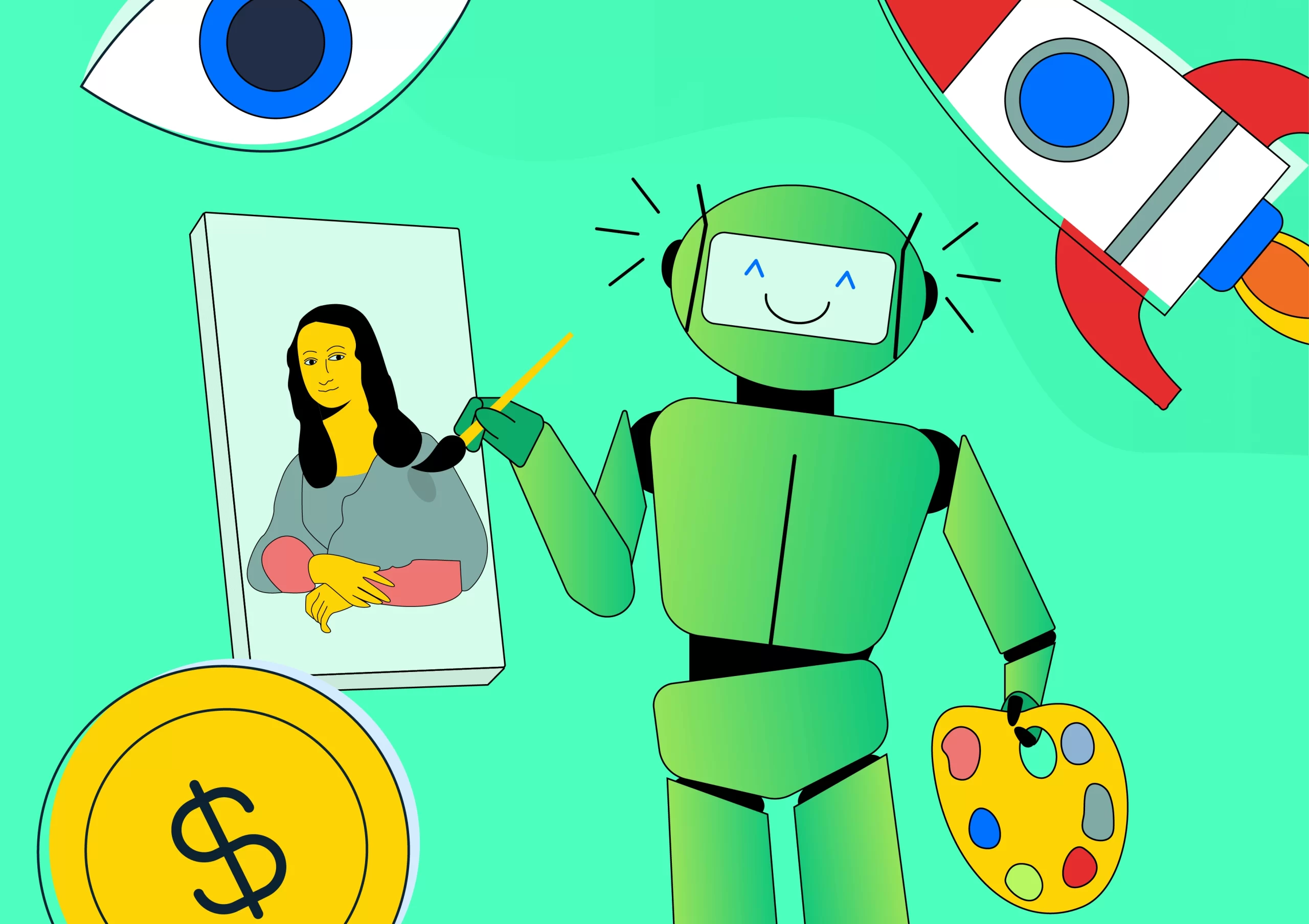
In today’s fast-paced and competitive business landscape, startups constantly seek innovative solutions to gain a competitive edge and enhance their operations. With the remarkable progress in artificial intelligence, integrating advanced language models like ChatGPT has emerged as a game-changer for startups across various industries.
In this article about using ChatGPT for startups, we’ll:
- Explore the world of ChatGPT and its cutting-edge technology;
- Delve into diverse uses of ChatGPT for startups;
- Uncover the transformative benefits of using ChatGPT for startups;
- Discover how startups can leverage ChatGPT to unlock new growth opportunities.
Let’s get started!
Table of contents
- ChatGPT and Startups: Short Overview
- When Your Startup Can Benefit From Incorporating ChatGPT and When Not
- 7 Examples of ChatGPT Usage for Startups
- Startup Success Stories with ChatGPT
- How Experienced Developers Can Help with ChatGPT
- Wrapping up
- FAQ
ChatGPT and Startups: Short Overview
ChatGPT offers an innovative and indispensable tool to empower emerging businesses with advanced language capabilities. Developed by OpenAI, ChatGPT is a cutting-edge language model based on the GPT-3.5 architecture, trained on a diverse range of data to generate human-like text. This versatile AI assistant can seamlessly integrate into various startup applications, such as customer support, content generation, and product recommendation systems. By leveraging ChatGPT, startups can enhance efficiency, engage users more effectively, and gain a competitive edge in today’s fast-paced digital landscape. With its natural language understanding and generation abilities, ChatGPT revolutionizes how startups interact with their audience, driving growth and fostering customer satisfaction.
When Your Startup Can Benefit From Incorporating ChatGPT and When Not
Incorporating ChatGPT can be highly beneficial for startups under various circumstances, but there are also situations where it may not be the best fit. Here are the top reasons for startup owners to consider when deciding whether to use ChatGPT.
When ChatGPT can benefit your startup:
- Enhanced Customer Support: If your startup deals with customer queries and support requests, ChatGPT can be invaluable in providing instant and personalized responses, reducing the workload on your support team, and improving customer satisfaction.
- Content Generation: Startups that require a consistent flow of high-quality content for their blogs, social media, or marketing campaigns can leverage ChatGPT to generate creative and engaging content efficiently.
- Scalability: ChatGPT’s ability to handle multiple user interactions simultaneously makes it an excellent choice for startups looking to scale their operations without compromising on user experience.
- Automation: If your startup performs repetitive tasks like data entry, ChatGPT can automate such processes, freeing up time and resources for your team to focus on more strategic activities.
- Prototyping and Testing: Startups in the development phase can use ChatGPT to quickly build and test prototypes of conversational interfaces, allowing for rapid feedback and iteration.
- Multilingual Capabilities: ChatGPT supports multiple languages, allowing startups to reach and engage with diverse global audiences, opening up new market opportunities.
- Technological Advancement: Integrating ChatGPT demonstrates a startup’s commitment to leveraging cutting-edge technology, which can enhance the company’s reputation, attract tech-savvy customers, and create a competitive advantage in the market.
- Time Savings: With ChatGPT automating repetitive tasks, startups can save valuable time and redirect their efforts toward core business activities and innovation.
FREE DOWNLOAD
A business’s step-by-step guide to an artificial intelligence projectDownload PDF
When ChatGPT might not be the best fit for your startup:
- Limited Budget: If your startup has severe budget constraints, investing in ChatGPT might not be a top priority, as AI language models can involve substantial costs, especially for extensive usage.
- Niche Audience: For startups targeting a highly specialized or niche market, the pre-trained nature of ChatGPT might not align perfectly with your audience’s specific domain language and requirements.
- Sensitive Data: If your startup handles sensitive or confidential data, using a third-party AI model like ChatGPT may raise security and privacy concerns, warranting a more customized and controlled solution.
- Existing Solutions: If your startup already has efficient systems in place for customer support or content generation, and those systems are meeting your needs, integrating ChatGPT might not offer significant additional benefits.
- Overreliance on AI: While ChatGPT can streamline processes and enhance user experiences, it’s essential to strike a balance and not over-rely on AI, as human interactions and personalized attention can still hold great value for certain startups.
- Complex Decision-Making: While ChatGPT is adept at handling a wide range of queries, it may not be suitable for intricate decision-making processes that require human intuition, judgment, or emotional understanding.
Ultimately, the decision to incorporate ChatGPT or any AI solution should be based on carefully evaluating your startup’s unique needs, budget, and long-term growth strategy. Before deciding, consider consulting with AI experts or conducting pilot tests to assess its impact.
7 Examples of ChatGPT Usage for Startups
We will explore seven innovative use cases where ChatGPT can empower startups to achieve greater efficiency, improved customer experiences, and enhanced productivity. From personalized customer support to content creation and market research, ChatGPT proves to be a valuable tool that can revolutionize the way startups operate and interact with their audiences. Let’s delve into these exciting applications and discover how ChatGPT can fuel growth and success for emerging businesses.
Use Case #1: Content Generation and Curation
Content creation and curation are critical for startups to establish their online presence, engage with their target audience, and drive website traffic. However, producing high-quality and relevant content can be time-consuming and resource-intensive. This is where ChatGPT can be a game-changer for startups.
How ChatGPT Helps:
- Automated Content Generation: Startups can use ChatGPT to automate the generation of blog posts, articles, product descriptions, and other types of content. ChatGPT can produce coherent and well-structured text that aligns with the startup’s desired tone and style by providing a few prompts or keywords. This automation streamlines content creation, saving the startup’s content team valuable time.
- SEO-Friendly Content: ChatGPT can be trained to produce content optimized for search engines, incorporating relevant keywords and topics. For example, an e-commerce startup can use ChatGPT to create product descriptions that not only describe the products but also include keywords that can boost the content’s visibility in search engine results.
- Content Ideation: ChatGPT can assist startups in brainstorming content ideas. By asking ChatGPT questions or providing general topics, startups can receive a list of potential article or blog post ideas, helping them overcome writer’s block and ensuring a consistent flow of content.
- Content Curation: Besides generating original content, ChatGPT can help startups curate existing content from reputable sources. For instance, a content curation startup can utilize ChatGPT to identify and summarize relevant articles, blog posts, or news pieces that align with their target audience’s interests.
- Multilingual Content: Startups aiming to expand their reach to international markets can use ChatGPT’s multilingual capabilities to generate content in different languages. This allows them to connect with a broader audience and tailor content to specific regions and cultures.
Example Scenario:
Let’s consider a fashion startup that regularly publishes blog posts to showcase its latest collections, fashion tips, and style trends. Instead of manually writing each blog post, they integrate ChatGPT into their content management system. The startup provides ChatGPT with a brief outline and relevant keywords for a new blog post about “Summer Fashion Trends.” ChatGPT then generates a well-structured and engaging blog post highlighting the latest summer fashion trends, accessorizing tips, and outfit ideas. The fashion startup can further review and edit the generated content to align it precisely with its brand voice before publishing it on its website and social media channels.
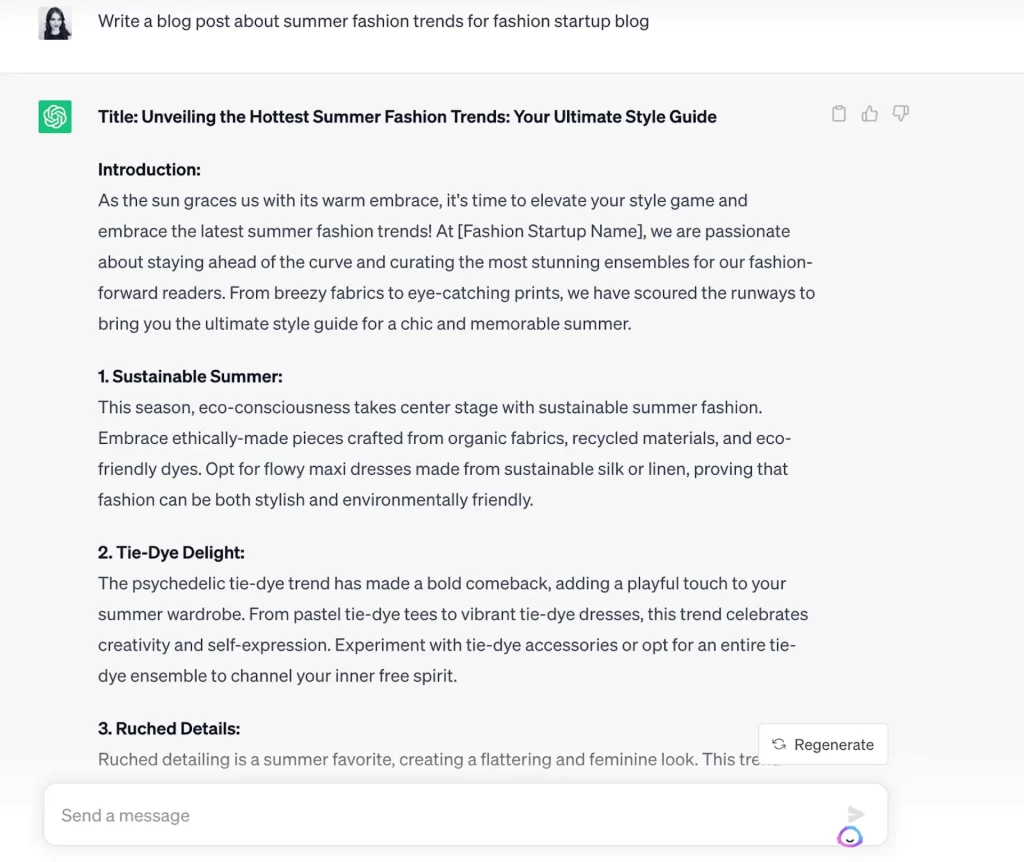
Using ChatGPT for content generation and curation, startups can efficiently produce high-quality content, maintain a consistent content schedule, and focus on other critical aspects of their business, ultimately attracting and retaining their target audience.
Use Case #2: Customer Support Automation
Providing exceptional customer support is crucial for startups to build a loyal customer base and foster long-term relationships. However, handling customer inquiries and support requests can be time-consuming and resource-intensive. This is where ChatGPT comes to the rescue, offering a powerful solution for automating customer support interactions.
How ChatGPT Helps:
- Instant Responses 24/7: ChatGPT operates round the clock, ensuring that customers receive instant responses to their queries anytime, even outside regular business hours. This enhanced availability boosts customer satisfaction and creates a positive impression of the startup’s responsiveness.
- Quick Answers to Common Queries: ChatGPT can be trained on a database of frequently asked questions and their corresponding answers. When customers inquire about common topics like shipping, returns, or product specifications, ChatGPT can provide accurate responses instantly, saving valuable time for both customers and support agents.
- Reduced Support Team Workload: ChatGPT lightens the workload for the customer support team by handling routine inquiries and repetitive tasks. Agents can focus on addressing more complex and unique issues, improving productivity and job satisfaction.
- Consistent and Uniform Responses: ChatGPT ensures that customers receive consistent and uniform responses across all interactions. This consistency helps maintain a cohesive brand image and deliver a seamless customer experience.
- Language Support: ChatGPT’s multilingual capabilities allow startups to cater to a diverse customer base. It can engage with customers in different languages, effectively breaking down language barriers and reaching a global audience.
- Data Collection and Analysis: ChatGPT can collect valuable data on customer inquiries, feedback, and common pain points. Startups can analyze this data to identify trends, gain insights into customer preferences, and make data-driven decisions to enhance their products or services.
Example Scenario:
Let’s consider a tech startup that offers a mobile app to manage personal finances. As their user base grows, they experience increasing customer support inquiries related to account setup, transaction issues, and app functionality. To handle this surge in customer queries efficiently, the startup integrates ChatGPT into its app’s chat support feature.
By utilizing ChatGPT for customer support automation, startups can deliver instant and consistent customer responses, streamline support operations, and provide a delightful user experience.
Use Case #3: Personalized Recommendations
One of the most valuable assets for startups is the ability to provide personalized recommendations to their users. With ChatGPT, startups can harness the power of artificial intelligence to understand user preferences, behaviors, and past interactions, allowing them to deliver tailored and relevant recommendations.
How ChatGPT Helps:
- User Behavior Analysis: ChatGPT can analyze user interactions, browsing history, and purchase patterns to gain insights into individual preferences. This analysis enables startups to understand their users better and anticipate their needs, leading to more accurate recommendations.
- Real-Time Suggestions: ChatGPT can offer real-time personalized suggestions during customer interactions. Whether it’s recommending products, services, or content, startups can create a seamless and intuitive user experience, enhancing engagement and customer satisfaction.
- Cross-Selling and Upselling: ChatGPT can suggest complementary products or upgrades by understanding user preferences and purchase history, increasing the potential for cross-selling and upselling opportunities. This strategic approach can boost revenue and customer retention.
- Content Personalization: Startups with content-driven platforms can utilize ChatGPT to personalize content recommendations based on user interests and engagement levels. By delivering relevant articles, videos, or product guides, startups can keep users engaged and returning for more.
- Improved User Engagement: Personalized recommendations foster a deeper connection with users, making them feel valued and understood by the startup. As a result, users are more likely to spend more time on the platform, explore additional offerings, and become brand advocates.
Example Scenario:
Let’s consider a fashion startup that offers an e-commerce platform. They integrate ChatGPT into their website’s chat widget, allowing users to seek style advice and recommendations. When users interact with ChatGPT, the AI-powered assistant prompts them to share their style preferences, favorite colors, and clothing sizes.
Using this information and analyzing the user’s past purchases, ChatGPT generates personalized recommendations for new clothing items, accessories, or outfits. For instance, ChatGPT might suggest matching sandals and a wide-brimmed hat for a complete summer look if a user recently bought a floral sundress.
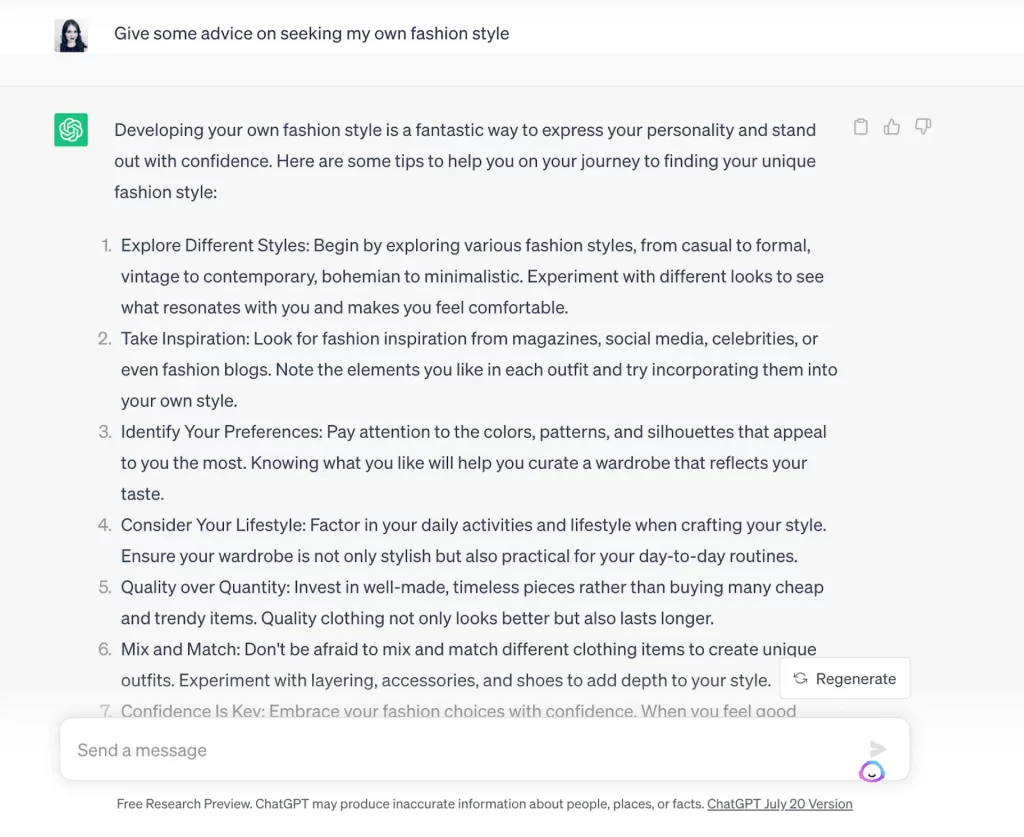
Use Case #4: Lead Qualification and Customer Surveys
For startups, efficiently qualifying leads and gathering valuable customer feedback are essential to understanding their target audience and making informed business decisions. ChatGPT can play a crucial role in automating lead qualification and conducting customer surveys, streamlining the process and ensuring startups can focus on nurturing quality leads and improving their products or services.
How ChatGPT Helps:
- Interactive Lead Qualification: ChatGPT can engage potential leads in interactive conversations to gather relevant information about their needs, preferences, and pain points. By asking targeted questions, ChatGPT can assess lead quality and readiness, helping startups prioritize and allocate resources more effectively.
- Automated Lead Nurturing: After initial lead qualification, ChatGPT can continue nurturing leads through follow-up interactions. By providing personalized information and addressing specific concerns, ChatGPT enhances lead engagement and increases the chances of conversion.
- Effortless Customer Surveys: Startups can employ ChatGPT to conduct customer surveys in a conversational format. By integrating survey questions into the chatbot, startups can gather valuable feedback from customers on their experiences, satisfaction levels, and suggestions for improvement.
- Real-Time Feedback Analysis: ChatGPT can analyze survey responses in real-time, providing startups with actionable insights and identifying trends or recurring themes. This enables quick responses to customer feedback and agile decision-making to address customer needs promptly.
- Multi-Channel Engagement: ChatGPT can be deployed across various communication channels, such as websites, social media platforms, or messaging apps. This allows startups to engage with leads and customers wherever they are, maximizing outreach and response rates.
Example Scenario:
Let’s consider a SaaS startup that offers project management software. To qualify potential leads, the startup integrates ChatGPT into its website’s landing page. When a visitor expresses interest in the software, ChatGPT initiates a conversation and asks questions about their organization’s size, industry, and specific project management needs.
Based on the responses, ChatGPT qualifies the lead and provides relevant resources or product information. If the lead shows interest in learning more, ChatGPT schedules a product demo or sends follow-up emails on behalf of the sales team.
Read also: 10 Chatbots Future Trends
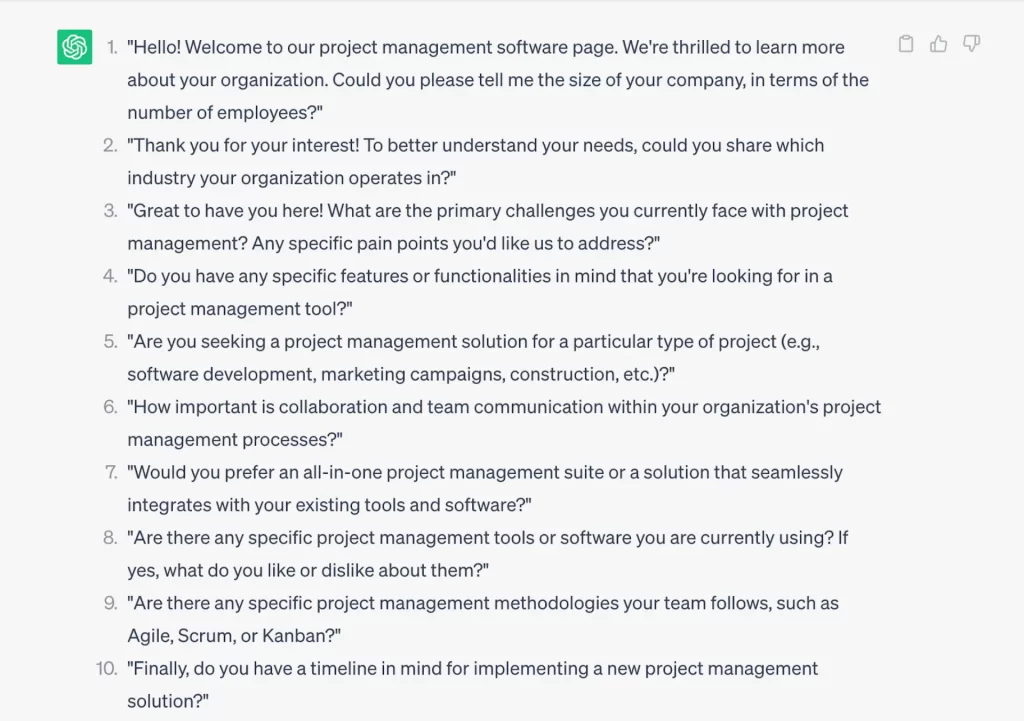
Use Case #5: Interactive Onboarding and Tutorials
For startups, providing a seamless onboarding experience for new users is crucial to ensure they understand the product’s features and benefits from the start. ChatGPT can play a pivotal role in interactive onboarding and tutorials, guiding users through the platform, answering their questions, and facilitating a smooth and engaging introduction to the startup’s offerings.
How ChatGPT Helps:
- Step-by-Step Guidance: ChatGPT can provide step-by-step guidance during the onboarding process, assisting users in setting up their accounts, configuring preferences, and exploring key functionalities. This interactive support helps users become familiar with the platform quickly.
- Real-Time Q&A: Users may have specific questions during onboarding. ChatGPT can address these questions in real-time, offering immediate assistance and reducing the need for manual intervention from the startup’s support team.
- Interactive Product Tours: ChatGPT can conduct interactive product tours, walking users through the platform’s various features and functionalities. This hands-on approach helps users grasp the platform’s value proposition effectively.
- Continuous Learning: Beyond initial onboarding, ChatGPT can serve as a knowledge base, allowing users to seek answers to questions or explore additional tutorials at their convenience. This ongoing learning support encourages user engagement and adoption of the platform.
Example Scenario:
Let’s consider a fintech startup that offers a mobile budgeting app. Upon downloading the app, new users are greeted by ChatGPT, which introduces itself as the user’s financial assistant. ChatGPT initiates an interactive onboarding process, asking users about their financial goals, income sources, and spending habits.
Based on the user’s responses, ChatGPT tailors the app’s features and recommends specific budgeting strategies to meet the user’s unique financial objectives. Throughout the onboarding journey, ChatGPT provides real-time explanations of app features and economic terms, ensuring users feel confident and empowered in managing their finances effectively.
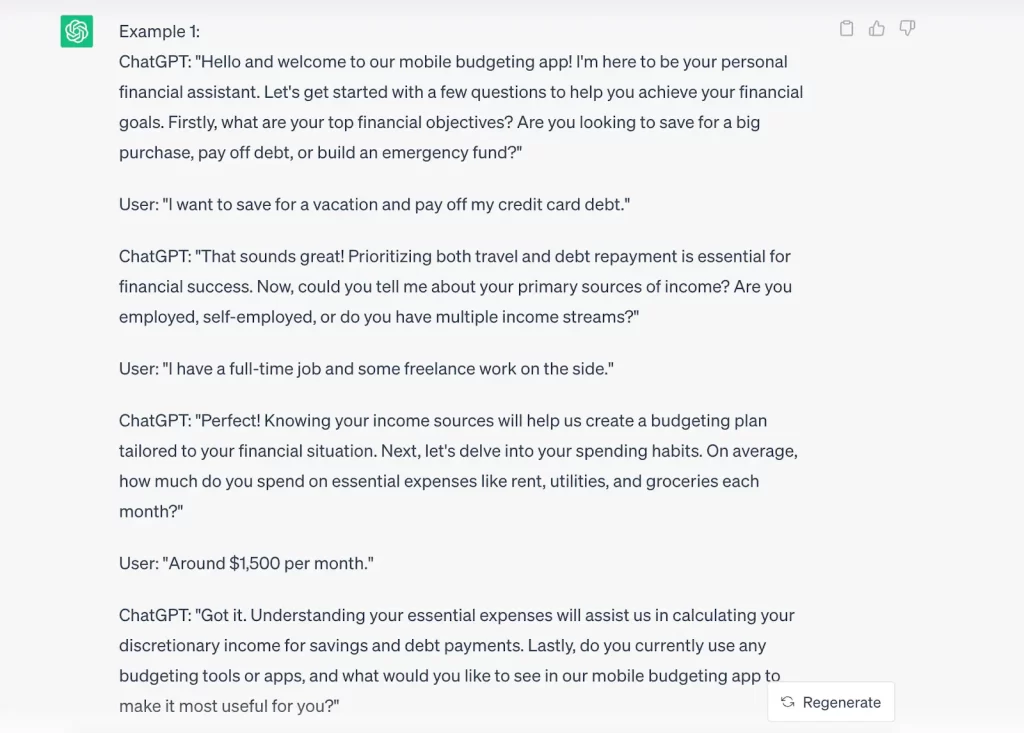
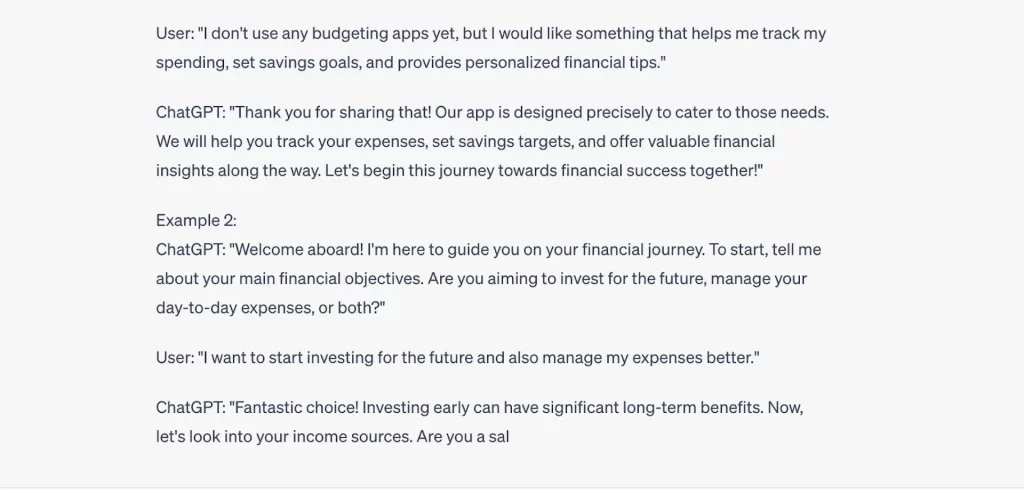
Read also about major chatbot types.
Use Case #6: Ideal Customer Profiles Discovery
For startups, understanding their ideal customer profiles is essential for targeted marketing, product development, and overall business growth. ChatGPT can be a valuable tool for discovering and refining perfect customer profiles and engaging in conversations with users to gather relevant information and insights that guide strategic decision-making.
How ChatGPT Helps:
- User Persona Creation: ChatGPT can interact with users and ask them questions to understand their demographics, preferences, interests, and pain points. This data can then be used to create detailed user personas representing the startup’s ideal customers.
- Behavioral Insights: By analyzing user interactions with ChatGPT, startups can gain behavioral insights, such as browsing patterns, purchasing behavior, and engagement levels—these insights aid in identifying common traits among potential ideal customers.
- Product-Market Fit Validation: ChatGPT can engage users in discussions about the startup’s products or services, gauging their interest and receptiveness. This validation helps startups understand whether their offerings align with their target audience’s needs.
- Segmentation and Targeting: With ChatGPT’s help, startups can segment their user base based on specific criteria, allowing for more targeted marketing efforts. ChatGPT can also suggest potential new customer segments based on user interactions.
- Iterative Refinement: Startups can continuously improve ChatGPT’s questions and prompts to delve deeper into user preferences and feedback. This iterative approach enables startups to refine their understanding of their ideal customer profiles.
Example Scenario:
Let’s consider a tech startup that offers an online platform for freelance professionals. The startup integrates ChatGPT into its onboarding process to discover its ideal customer profiles. ChatGPT initiates conversations with new users, asking questions about their skills, industries of interest, preferred project types, and desired income levels.
ChatGPT gains insights into the users’ backgrounds, goals, and motivations through these interactions. The startup analyzes the data collected by ChatGPT to identify recurring patterns, such as the most common industries freelancers are interested in or their preferred project sizes.
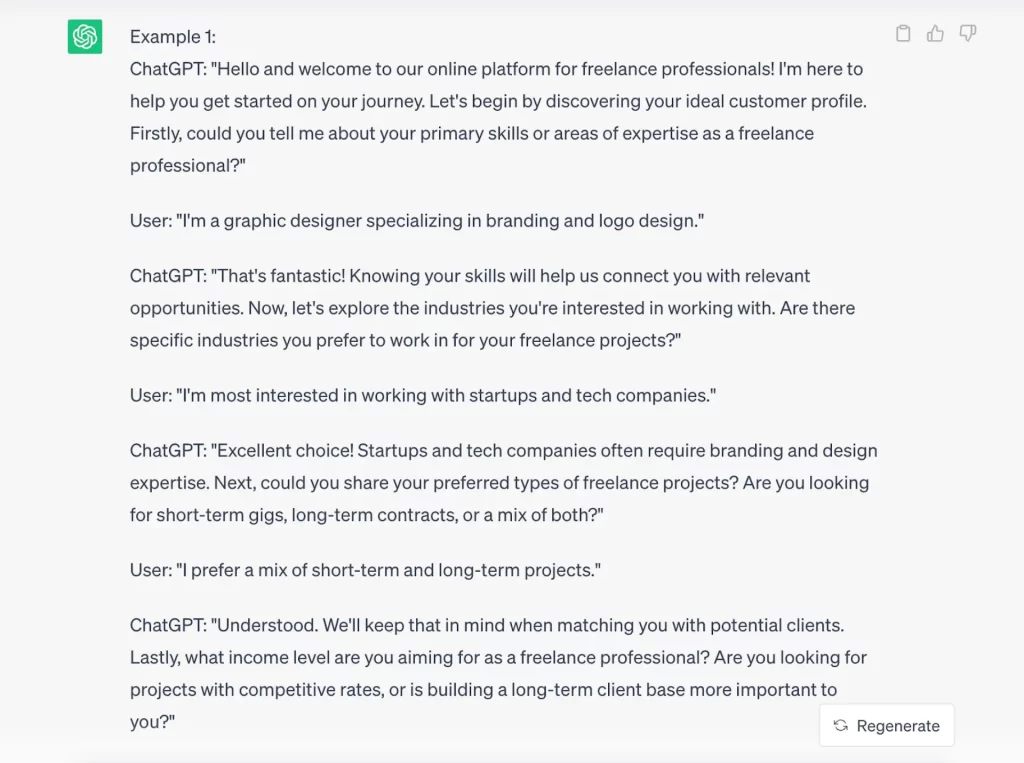
Based on these insights, the startup refines its ideal customer profiles, tailoring its marketing efforts and platform features to attract and serve the most relevant audience. As the startup grows and gathers more data, ChatGPT continues to assist in refining these profiles and expanding the understanding of its target market.
Startup Success Stories with ChatGPT
From enhancing customer experiences to streamlining operations and making informed decisions, these startups leveraged ChatGPT’s capabilities to achieve unprecedented growth and success. These stories serve as a testament to the boundless potential of AI in driving entrepreneurship and paving the way for a future defined by ingenuity and transformative technology.
Microsoft
Microsoft has been a strong supporter of ChatGPT and a significant investor in OpenAI, the creator of the technology. The language models behind ChatGPT, GPT-3, and GPT-4, now power Bing search engine, enabling users to interact with it conversationally. Microsoft is further planning to integrate this technology into its popular software services like Word and Excel. Additionally, Microsoft uses Codex, a modified version of GPT-3, to offer auto-complete coding suggestions through GitHub Co-Pilot.
Duolingo
Duolingo, the language education specialist, has introduced two new features powered by GPT-4, the most robust language model from OpenAI’s LLMs. The first feature, Duolingo Max, provides language students with detailed explanations in natural language, similar to those given by human tutors, for their practice or test questions. The second feature enables students to enhance their language skills through role-playing with AI personas, like interacting with a barista in a Parisian café. Each persona comes with unique personalities and backstories that users can discover as they engage with them.
Slack
Slack, the collaborative workspace platform, has developed an app that enables its users to harness the capabilities of ChatGPT for workflow management, productivity enhancement, and seamless communication with colleagues. With this plugin, users have constant access to an assistant that can provide answers to queries and offer valuable suggestions to propel their ongoing projects forward effectively.
How Experienced Developers Can Help with ChatGPT
Experienced Alternative-spaces developers can play a crucial role in helping startups integrate ChatGPT effectively. Here’s how experienced Alternative-spaces developers can assist startups in this process:
- Understanding Startup Needs: Alternative-spaces developers will begin by thoroughly understanding the startup’s requirements and use cases. They’ll work closely with the startup team to identify areas where ChatGPT can add value, such as customer support, content generation, language translation, or personalized recommendations.
- Model Selection and Configuration: Alternative-spaces developers will guide startups in choosing the appropriate version of ChatGPT (e.g., GPT-3, GPT-4) based on the startup’s needs and budget. They’ll also help configure the model, fine-tune parameters, and set appropriate constraints to ensure the AI responds effectively and adheres to ethical guidelines.
- Data Preparation: Training a language model like ChatGPT requires vast data. Alternative-spaces developers will assist startups in collecting and preparing relevant datasets to ensure that ChatGPT understands the context and provides accurate responses.
- Integration with Existing Systems: Alternative-spaces developers will seamlessly integrate ChatGPT with the startup’s software infrastructure and applications. Whether it’s a web-based platform, mobile app, or backend system, they’ll ensure a smooth integration process.
- User Interface Design: Effectively incorporating ChatGPT into the user interface is essential for a positive user experience. Alternative-spaces developers will help design intuitive chat interfaces, ensuring the AI’s responses are easily accessible and user-friendly.
- Natural Language Understanding: ChatGPT must comprehend user inputs accurately to provide relevant responses. Alternative-spaces developers will optimize the natural language understanding (NLU) pipeline, ensuring ChatGPT interprets user queries accurately.
- Performance Optimization: Experienced Alternative-spaces developers have the skills to optimize the performance of ChatGPT, making it faster and more efficient in responding to user queries. This includes techniques like caching, parallel processing, and load balancing.
- Security and Privacy: Alternative-spaces developers will address security and privacy concerns about using an AI language model. They’ll implement encryption, user authentication, and data anonymization techniques to protect sensitive information.
- Continuous Improvement: Integration of ChatGPT is an iterative process. Alternative-spaces developers will continuously monitor the AI’s performance and gather user feedback to improve the model’s accuracy and relevance.
- Scalability: As startups grow, the demand for ChatGPT may increase. Alternative-spaces developers will ensure the integration is scalable and can handle higher user loads without compromising performance.
- Error Handling and Fail-Safes: ChatGPT may occasionally provide incorrect or inappropriate responses. Alternative-spaces developers will implement robust error-handling mechanisms and fail-safes to mitigate potential risks.
- Compliance and Legal Considerations: Alternative-spaces developers will assist startups in understanding the legal implications of using ChatGPT, ensuring compliance with relevant regulations and terms of service.
Recently, our company achieved a milestone by developing a chatbot that functions as a virtual HR manager, capable of generating greetings for any occasion. By specifying { role: ‘system’, content: ‘I am HR-manager it-company’ } in the system message, the chatbot accurately understands its audience and delivers personalized responses accordingly.
Thus, at Alternative-spaces, we are committed to pushing the boundaries of AI technology and delivering cutting-edge solutions that address real-world challenges. Contact us today to explore the possibilities of AI-driven innovation for your organization. Together, we can shape a smarter future through AI advancements.
Wrapping up
In conclusion, ChatGPT has emerged as a game-changer for startups, unlocking a myriad of possibilities to enhance their operations and customer interactions. From personalized customer support to lead qualification and content creation, this versatile AI language model empowers startups to reach new heights of efficiency and productivity.
For startups looking to harness the potential of ChatGPT, seamless integration is essential to ensure a smooth and successful implementation. That’s where Alternative-spaces comes in. As a leading AI integration partner, Alternative-spaces can assist startups in seamlessly integrating ChatGPT into their websites or platforms, making the onboarding process a breeze and unlocking the full potential of this revolutionary technology.
Don’t miss out on the opportunity to leverage the capabilities of ChatGPT for your startup’s success. Reach out to Alternative-spaces today and embark on a journey of innovation, efficiency, and exceptional customer experiences with ChatGPT!
FAQ
Q1: What is ChatGPT, and how can it benefit startups?
A1: ChatGPT is an AI language model that can provide interactive and personalized conversations with users. For startups, it offers efficient customer support, content creation, market research, and enhances productivity through various use cases.
Q2: How can ChatGPT be integrated into a startup’s website or platform?
A2: Integrating ChatGPT is seamless. Startups can embed ChatGPT as a chatbot on their website’s landing page, offering a personalized onboarding experience, lead qualification, and real-time customer interactions.
Q3: Can ChatGPT qualify potential leads for a startup?
A3: Yes, ChatGPT can initiate conversations with website visitors, asking questions about their organization’s size, industry, and specific needs. Based on their responses, ChatGPT can qualify leads and provide relevant resources or product information.
Q4: Is ChatGPT suitable for fintech and SaaS startups?
A4: Absolutely! ChatGPT can be adapted to various industries, including fintech and SaaS. It can assist fintech startups in financial planning and SaaS startups in project management, making it a valuable tool for diverse businesses.
Content created by our partner, Onix-systems.
Source: https://onix-systems.com/blog/uses-chatgpt-for-startups-guide Home
Home